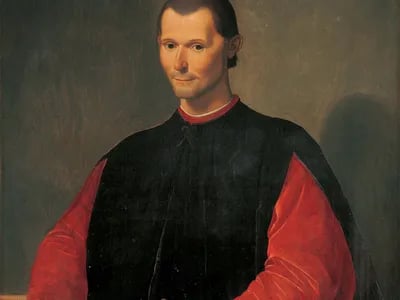UPSC PSIR: Explain how Machiavelli’s application of empirical method to human affairs marks an important stage in the evolution of political science. (20M – 2014)
Can politics be moral and effective at the same time? Machiavelli didn’t think so. Breaking away from the idealism of Plato and Aristotle, Niccolò Machiavelli laid the foundations of modern political science by anchoring it in reality, not morality. Discover how The Prince shaped modern political thinking, influenced thinkers like Hobbes and Weber, and why critics like Rousseau and Isaiah Berlin accuse him of amoral realism. This blog is your complete UPSC-ready guide to Machiavelli’s political philosophy.
PSIR
8/3/20252 min read


🏛️ Machiavelli: A Modern Break from Classical Norms
Isaiah Berlin famously said,
“Machiavelli was the first to divorce politics from ethics.”
Unlike ancient philosophers who asked what ought to be, Machiavelli asked what is. His seminal work The Prince marked a shift from normative ethics to empirical political analysis.
He chose to study power as it functioned in real life, not as an extension of divine order or virtue.
🔍 Key Ideas in Machiavellian Thought
1. Empirical and Historical Method
Politics must be studied as it is, not as imagined.
Used historical case studies of rulers—successes and failures—to inform strategies.
Machiavelli believed human nature is constant, and thus lessons from history are repeatable.
📖 "Go directly to the actual truth of the thing rather than the imagination of it."
2. Universal Egoism
Human beings are self-interested and power-seeking.
His view aligns with psychological egoism later seen in Hobbes.
3. Power over Morality
Power must be preserved, even through deceit, manipulation, or violence.
“It is better to be feared than loved, if you cannot be both.”
This pragmatism led to Machiavelli’s name becoming synonymous with cunning politics.
4. Practical Rulership
Statecraft is about results, not righteousness.
Leadership must be adaptive, bold, and shrewd, unafraid of using force or fraud.
📚 Influence on Political Thought
🧠 Thomas Hobbes
Adopted empirical approach; focused on order and control through a Leviathan (strong sovereign).
🏛 Antonio Gramsci
Saw Machiavelli as the ‘politico in atto’, a model of praxis—unity of theory and action.
🧰 Max Weber
Separated ethics of conviction (moral duty) from ethics of responsibility (consequences).
Bureaucratic rationalism built on power without moral illusion.
🌍 Hans Morgenthau (Realism in IR)
Echoed Machiavellian realpolitik: states pursue power in an anarchic world.
🧨 Criticism of Machiavelli
1. Rousseau:
Criticized Machiavelli for promoting cynicism and manipulation in politics.
Believed it undermined the foundation of a moral and virtuous society.
2. Leo Strauss:
Accused Machiavelli of abandoning classical virtues like justice and moderation.
Saw him as embracing a kind of political nihilism.
3. Isaiah Berlin:
Warned that Machiavelli’s realist approach could justify tyranny and authoritarianism.
Saw his ideas as a threat to liberal democratic values.
🛠️ Machiavelli's Legacy: Beyond "The Prince"
Despite criticism, Machiavelli’s scientific, realist, and empirical approach shaped:
The behavioural revolution in political science (20th century)
The field of comparative politics and realism in international relations
Modern political strategy—from campaign planning to diplomacy
His ideas remain influential in analyzing how power is acquired, retained, and exercised—still foundational in realpolitik and statecraft today.
🧾 Conclusion: The Realist's Realist
Machiavelli’s lasting legacy lies in his refusal to see politics through rose-tinted glasses. By replacing virtue with verità effettuale (the effectual truth), he redefined politics as a domain of its own—distinct from religion, morality, and utopia.